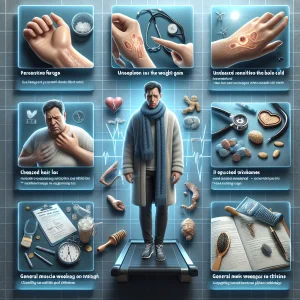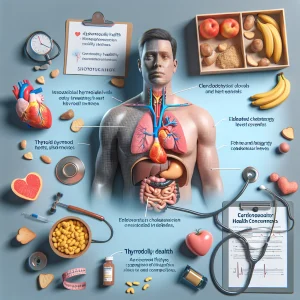In-Depth Analysis of the Health Risks Associated with Hypothyroidism in Men
Hypothyroidism in men represents a crucial health concern stemming from the thyroid gland’s inability to produce sufficient amounts of essential hormones. The key hormones involved, thyroxine (T4) and triiodothyronine (T3), are critical for regulating various bodily functions, including metabolism, energy levels, and overall health. While this condition can affect individuals across genders, men face unique challenges that require attention. A thorough understanding of these challenges is vital for effective treatment and management, ultimately helping men sustain their quality of life and overall wellness.
Gaining a comprehensive understanding of hypothyroidism is essential for its effective management and treatment. Many men may overlook symptoms, attributing them to mere fatigue or stress, often related to their hectic lifestyles or the aging process. This misinterpretation can lead to prolonged discomfort and the potential for serious health complications. Early detection is paramount; recognizing symptoms in their initial stages can facilitate timely interventions that significantly improve health outcomes and enhance overall well-being.
A multitude of factors can trigger the onset of hypothyroidism, including autoimmune disorders such as Hashimoto’s thyroiditis, certain medications, and complications from radiation therapy. Identifying these symptoms early is crucial for implementing appropriate intervention strategies, ultimately leading to better health and an improved quality of life for affected individuals.
Essential Knowledge for Men Regarding Hypothyroidism
- Hypothyroidism arises from inadequate production of thyroid hormones, resulting in various physical and mental health challenges specifically for men.
- Common physical symptoms may encompass persistent fatigue, unexpected weight gain, hair thinning, and muscle weakness, alongside increased risks for high cholesterol, heart disease, and diabetes.
- The psychological ramifications can manifest as depression, anxiety, and cognitive difficulties, severely impacting a man’s overall quality of life.
- This condition can detrimentally affect sexual health, potentially leading to reduced libido, erectile dysfunction, and fertility challenges.
- Weight management can become particularly challenging, as low thyroid hormone levels slow metabolism, complicating efforts to achieve and maintain a healthy weight.
 Identifying the Physical Symptoms and Health Risks Linked to Hypothyroidism
Identifying the Physical Symptoms and Health Risks Linked to Hypothyroidism
The physical symptoms associated with hypothyroidism can vary significantly among individuals. Men suffering from this condition frequently report chronic fatigue, unexpected weight gain, heightened sensitivity to cold, and muscle weakness. You might find yourself feeling unusually tired after a full night’s sleep or struggling with weight maintenance, even while adhering to a healthy diet and exercising regularly. Recognizing these symptoms is the first step towards understanding the underlying issues at play.
Such symptoms can lead to self-doubt regarding your health and lifestyle choices. Additionally, hypothyroidism can manifest in subtler ways, such as dry or pale skin and increased hair loss. Early recognition and addressing these symptoms are crucial for effective management and restoring health. Acknowledging these changes can prompt timely medical consultations, ultimately facilitating appropriate interventions and support.
Moreover, hypothyroidism can result in a slower heart rate, contributing to persistent feelings of lethargy and diminished stamina when engaging in physical activities. The cumulative impact of these symptoms can significantly disrupt daily life and functionality. Therefore, if you suspect that hypothyroidism may be negatively influencing your health, seeking medical advice is imperative to ensure proper diagnosis and treatment.
Understanding the Mental and Emotional Challenges Associated with Hypothyroidism
The mental and emotional repercussions of hypothyroidism are often underestimated, yet they deserve significant attention. As levels of thyroid hormones decrease, you may experience mood swings, exacerbated feelings of depression, and heightened anxiety. These emotional fluctuations can lead to irritability and fatigue, which can strain personal relationships and diminish overall satisfaction in life.
Research has illuminated the complex relationship between thyroid function and mental health, emphasizing the importance of acknowledging this connection for effective treatment. Cognitive decline is also a significant concern; individuals frequently report symptoms like “brain fog.” You might struggle with concentration, forget everyday tasks, or feel mentally sluggish, particularly in environments that demand quick thinking and clarity of thought.
Acknowledging these cognitive and emotional challenges is vital for advocating appropriate medical treatment. For a deeper understanding of the relationship between hypothyroidism and mental health, consider exploring resources available on the Mayo Clinic’s website, which provides valuable information and support.
 The Significant Impact of Hypothyroidism on Male Sexual Health
The Significant Impact of Hypothyroidism on Male Sexual Health
Hypothyroidism can profoundly affect sexual health in men, leading to various complications that can impact intimate relationships. Reduced thyroid hormone levels may result in diminished libido, erectile dysfunction, and potential infertility. You might notice a noticeable decrease in your interest in sexual activity or encounter challenges in achieving or maintaining an erection.
These sexual health challenges can be distressing, provoking feelings of inadequacy, frustration, and anxiety within intimate relationships. The hormonal imbalances induced by hypothyroidism can also disrupt testosterone levels, adding complexity to the already intricate nature of sexual health. Low testosterone often contributes to increased fatigue, emotional instability, and reduced sexual desire, creating a challenging cycle that can be difficult to navigate.
It is crucial to engage in open and honest discussions with your healthcare provider regarding these sexual health concerns. Exploring effective treatment options can assist in restoring both thyroid function and sexual health, ensuring a comprehensive approach to overall well-being.
Effective Strategies for Managing Weight Challenges Associated with Hypothyroidism
Weight management often proves to be particularly challenging for men diagnosed with hypothyroidism. The reduced metabolic rate commonly associated with low thyroid hormone levels can significantly hinder your ability to lose or maintain a healthy weight. Even with a consistent exercise routine and a balanced diet, you may find it exceptionally difficult to shed unwanted pounds.
This ongoing struggle can lead to feelings of frustration and hopelessness regarding weight management. Understanding the connection between hypothyroidism and weight gain is essential for developing effective strategies to combat these challenges. Collaborating closely with a healthcare provider enables you to create a personalized plan that effectively addresses both thyroid health and weight management goals.
This collaborative approach may include adjusting medications, modifying dietary habits, and incorporating specific exercise routines designed to enhance metabolism while considering your energy levels and overall well-being.
 Understanding the Connection Between Hypothyroidism and Cardiovascular Health Risks
Understanding the Connection Between Hypothyroidism and Cardiovascular Health Risks
The relationship between hypothyroidism and cardiovascular health is a pressing concern for men diagnosed with this condition. Insufficient thyroid hormone levels can lead to elevated cholesterol levels, thereby increasing the risk of heart disease over time. It’s crucial to recognize that the fatigue and lethargy often associated with hypothyroidism may not only be symptoms of the disorder but could also indicate underlying cardiovascular issues that necessitate medical attention.
Regular cardiovascular assessments are vital for individuals with hypothyroidism to monitor heart health. Your healthcare provider might recommend lifestyle changes, including a heart-healthy diet rich in fruits, vegetables, whole grains, and lean proteins. Furthermore, engaging in regular physical activity that aligns with your energy levels can support thyroid function and enhance cardiovascular health. By proactively managing both thyroid function and cardiovascular fitness, you can significantly reduce the risk of further health complications.
Investigating the Impact of Hypothyroidism on Male Fertility
Fertility challenges represent a critical aspect of hypothyroidism in men. Low levels of thyroid hormones can disrupt the delicate hormonal balance necessary for proper sperm production and overall reproductive health. If you are encountering difficulties in conceiving, it’s essential to evaluate how your thyroid function may be influencing your fertility journey.
Effectively treating hypothyroidism can not only improve your overall health but also increase the likelihood of successful conception. Collaborating with a knowledgeable healthcare provider who understands the intricate relationship between thyroid function and fertility is essential for developing a comprehensive strategy that addresses both concerns. This may include routine monitoring of hormone levels through blood tests and modifying medications to optimize reproductive health, ensuring that all aspects of your well-being are taken into account.
Holistic Approaches to Managing and Treating Hypothyroidism Effectively in Men
Successfully managing hypothyroidism necessitates a holistic approach that encompasses regular monitoring through blood tests, medication management, lifestyle adjustments, and open communication with healthcare professionals. Blood tests are essential for diagnosing hypothyroidism, measuring key indicators such as Thyroid-Stimulating Hormone (TSH) and T4 levels. Elevated TSH levels typically indicate an underactive thyroid, while low T4 levels confirm the diagnosis.
Upon diagnosis, treatment generally involves hormone replacement therapy with synthetic thyroid hormones such as levothyroxine. This medication plays a crucial role in restoring normal hormone levels and alleviating many of the symptoms associated with hypothyroidism. Regular follow-up appointments are vital for assessing treatment effectiveness and making necessary adjustments based on blood test results.
In addition to medication, lifestyle modifications—such as adopting a nutrient-rich diet that supports thyroid health, including adequate iodine, selenium, and zinc—can prove beneficial. Engaging in consistent exercise that aligns with your energy levels can manage symptoms while enhancing overall wellness. By actively participating in your health management through education, collaboration with healthcare providers, and lifestyle changes, you can lead a fulfilling life despite the challenges posed by hypothyroidism.
Common Questions Regarding Hypothyroidism in Men
What is hypothyroidism in men?
Hypothyroidism in men refers to a condition where the thyroid gland fails to produce adequate thyroid hormones, leading to a slowdown in metabolism and a variety of health issues.
What are the common symptoms of hypothyroidism in men?
Typical symptoms of hypothyroidism in men include fatigue, weight gain, cold sensitivity, dry skin, constipation, muscle weakness, and signs of depression.
How is hypothyroidism diagnosed in men?
The diagnosis of hypothyroidism in men is made through blood tests that measure levels of thyroid-stimulating hormone (TSH) and thyroxine (T4) in the bloodstream.
What causes hypothyroidism in men?
The primary cause of hypothyroidism in men is often Hashimoto’s thyroiditis, an autoimmune disorder. Other contributing factors can include thyroid surgery, radiation treatment, and certain medications.
What treatment options are available for men with hypothyroidism?
Men diagnosed with hypothyroidism typically receive treatment through synthetic thyroid hormone medications, such as levothyroxine, which helps replace deficient hormones and restore normal thyroid function.
Can hypothyroidism lead to other health complications in men?
If left untreated, hypothyroidism in men can lead to complications such as heart disease, fertility issues, and mental health challenges. Seeking timely treatment is essential to mitigate these risks and maintain overall health.
This Content Is Sponsored By: Thyroid Testing UK
Hypothyroidism in Men: The Impact On Health Was First Published By https://bloodtest.co.uk
Find Us On Facebook: EZ Blood Tests
The Article: Hypothyroidism in Men: Health Implications Explored appeared first on: https://ezbloodtest.com
The Article Hypothyroidism in Men: Exploring Health Implications Was Found On https://limitsofstrategy.com


